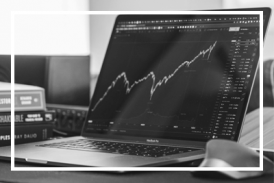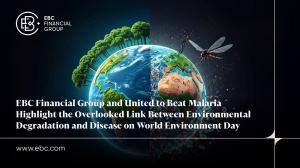EBC Financial Group and United to Beat Malaria Highlight How Environmental Issues Fuel Disease on World Environment Day
As climate change and pollution boost vector-borne diseases like malaria, EBC reinforces support for health efforts rooted in environmental awareness and equity
DC, UNITED STATES, June 5, 2025 /EINPresswire.com/ -- On World Environment Day 2025, as the global community rallies around the theme “Ending Plastic Pollution,” EBC Financial Group (EBC) is drawing attention to a lesser-discussed consequence of environmental neglect: the alarming rise of mosquito-borne diseases like malaria.
Through its partnership with the United Nations Foundation’s United to Beat Malaria campaign, now in its second year, EBC is urging public and private stakeholders to confront the interconnected crises of climate instability, pollution, health, and economic inequality—and to embrace climate-smart finance as a key solution in preventing disease and building community resilience.
“We often view malaria as a medical issue—but it’s also an ecological one,” said David Barrett, CEO of EBC Financial Group (UK) Ltd. “Plastic waste, deforestation, and warming temperatures all create the perfect storm for mosquitoes to thrive. Through our partnership with United to Beat Malaria, we’re investing in scalable, frontline interventions that protect both people and ecosystems.”
Climate Change Is Redrawing the Malaria Map
Environmental shifts are accelerating the spread of malaria across regions once considered low risk. Deforestation and rising temperatures are pushing mosquito populations into higher altitudes and new territories, while plastic pollution creates stagnant water reservoirs that act as breeding grounds.
In Colombia and the Amazon basin, deforestation has dramatically increased exposure to malaria in rural populations and Indigenous communities. In Bangladesh, flooding and water stagnation exacerbated by plastic pollution are fuelling outbreaks in already fragile areas. Even southern Europe has reported isolated cases, with climate shifts increasing mosquito survival rates in areas which are hitherto mosquito-free.
These changes carry significant economic implications: in sub-Saharan Africa, for example, malaria contributes to a loss of approximately 1.3% of GDP annually, with ripple effects across healthcare systems, productivity, and education. The disease is responsible for up to half a billion lost workdays in Africa each year, and causes an estimated $12 billion in lost productivity annually—a toll borne disproportionately by children, working-age adults, and low-income communities
Climate-Smart Finance and Collective Action
In 2025, EBC renewed its commitment to United to Beat Malaria by becoming an official corporate sponsor of the Move Against Malaria 5K, mobilising over 200 employees across its offices in the UK, Africa, Asia, and Latin America. The challenge, which ran from April 25 to May 10, 2025, not only raised awareness but deepened engagement at all levels of the company, reflecting EBC’s belief that advocacy must be embedded into leadership and organisational culture.
“Finance can be a force for regeneration,” Barrett commented. “That’s why we’re supporting community-led health interventions, amplifying awareness, and backing solutions that address the root causes—not just the symptoms—of inequality.”
At the 2025 United to Beat Malaria Annual Leadership Summit in Washington, D.C., Barrett and Samuel Hertz, the EBC Director of Operations, joined more than 120 advocates and policymakers in calling for sustained global investment. They participated in direct policy discussions on Capitol Hill, urging support for critical programs like the President’s Malaria Initiative, The Global Fund, and UN-led interventions.
Purposeful Finance for Health Equity
EBC’s partnership is not just symbolic—it funds insecticide-treated bed nets, rapid diagnostic kits, and antimalarial treatments across the regions most affected. In 2024 alone, United to Beat Malaria helped protect 1.67 million people in Sub-Saharan Africa and across 20 countries in Latin America and the Caribbean, where healthcare access remains limited and climate vulnerabilities are high.
As World Environment Day highlights the environmental crisis of plastic pollution, EBC highlights the urgent need for cross-sector collaboration—where ecological stewardship, health protection, and economic stability are pursued hand-in-hand.
To learn more about EBC’s partnership with United to Beat Malaria, visit www.ebc.com/malaria.
About EBC Financial Group
Founded in London’s esteemed financial district, EBC Financial Group (EBC) is a global brand known for its expertise in financial brokerage and asset management. Through its regulated entities operating across major financial jurisdictions—including the UK, Australia, the Cayman Islands, Mauritius, and others—EBC enables retail, professional, and institutional investors to access a wide range of global markets and trading opportunities, including currencies, commodities, shares, and indices.
Recognised with multiple awards, EBC is committed to upholding ethical standards and is licensed and regulated within the respective jurisdictions. EBC Financial Group (UK) Limited is regulated by the UK's Financial Conduct Authority (FCA); EBC Financial Group (Cayman) Limited is regulated by the Cayman Islands Monetary Authority (CIMA); EBC Financial Group (Australia) Pty Ltd, and EBC Asset Management Pty Ltd are regulated by Australia's Securities and Investments Commission (ASIC); EBC Financial (MU) Ltd is authorised and regulated by the Financial Services Commission Mauritius (FSC).
At the core of EBC are a team of industry veterans with over 40 years of experience in major financial institutions. Having navigated key economic cycles from the Plaza Accord and 2015 Swiss franc crisis to the market upheavals of the COVID-19 pandemic. We foster a culture where integrity, respect, and client asset security are paramount, ensuring that every investor relationship is handled with the utmost seriousness it deserves.
As the Official Foreign Exchange Partner of FC Barcelona, EBC provides specialised services across Asia, LATAM, the Middle East, Africa, and Oceania. Through its partnership with United to Beat Malaria, the company contributes to global health initiatives. EBC also supports the 'What Economists Really Do' public engagement series by Oxford University's Department of Economics, helping to demystify economics and its application to major societal challenges, fostering greater public understanding and dialogue.
Michelle Siow
EBC Financial Group
+ +60 163376040
email us here
Visit us on social media:
LinkedIn
Instagram
Facebook
YouTube
X
Other
Legal Disclaimer:
EIN Presswire provides this news content "as is" without warranty of any kind. We do not accept any responsibility or liability for the accuracy, content, images, videos, licenses, completeness, legality, or reliability of the information contained in this article. If you have any complaints or copyright issues related to this article, kindly contact the author above.
Resource Design & Build, LLC Completes Renovation at 6477 Old Shadburn Ferry Road
Naples Soccer Academy Welcomes Peter Giannopoulos as Director of Security
Dino Days A Dinosaur Themed Train Ride Sept. 13th & 14th Phillipsburg, NJ
Więcej ważnych informacji
 Jedynka Newserii
Jedynka Newserii

 Jedynka Newserii
Jedynka Newserii

Konsument

Polacy nie korzystają z hossy trwającej na warszawskiej giełdzie. Na wzrostach zarabiają głównie inwestorzy zagraniczni
Od października 2022 roku na rynkach akcji trwa hossa, nie omija ona także warszawskiej giełdy. Mimo to inwestorzy indywidualni odpowiadają zaledwie za kilkanaście procent inwestycji, a o wzrostach decyduje i na nich zarabia głównie kapitał z zagranicy. Widać to również po napływach i odpływach do i z funduszy inwestycyjnych. Zdaniem Tomasza Koraba, prezesa EQUES Investment TFI, do przekonania Polaków do inwestowania na rodzimej giełdzie potrzeba zysków z akcji, informacji o tych zyskach docierającej do konsumentów oraz czasu.
Polityka
Obowiązek zapełniania magazynów gazu w UE przed sezonem zimowym ma zapewnić bezpieczeństwo dostaw. Wpłynie też na stabilizację cen

Unia Europejska przedłuży przepisy z 2022 roku dotyczące magazynowania gazu. Będą one obowiązywać do końca 2027 roku. Zobowiązują one państwa członkowskie do osiągnięcia określonego poziomu zapełnienia magazynów gazu przed sezonem zimowym. Magazyny gazu pokrywają 30 proc. zapotrzebowania Unii Europejskiej na niego w miesiącach zimowych. Nowe unijne przepisy mają zapewnić stabilne i przystępne cenowo dostawy.
Infrastruktura
Gminy zwlekają z uchwaleniem planów ogólnych zagospodarowania przestrzennego. Może to spowodować przesunięcie terminu ich wejścia w życie

Reforma systemu planowania i zagospodarowania przestrzennego rozpoczęła się we wrześniu 2023 roku wraz z wejściem w życie większości przepisów nowelizacji ustawy z 27 marca 2003 roku. Uwzględniono w niej plany ogólne gminy (POG) – nowe dokumenty planistyczne, za których przygotowanie mają odpowiadać samorządy. Rada Ministrów w kwietniu br. uchwaliła jednak ustawę o zmianie ustawy z 7 lipca 2023 roku, a jej celem jest zmiana terminu obowiązywania studiów uwarunkowań i kierunków zagospodarowania przestrzennego gmin na 30 czerwca 2026 roku. Wskazana data może nie być ostateczna z uwagi na to, że żadna z gmin nie uchwaliła jeszcze POG.
Partner serwisu
Szkolenia

Akademia Newserii
Akademia Newserii to projekt, w ramach którego najlepsi polscy dziennikarze biznesowi, giełdowi oraz lifestylowi, a także szkoleniowcy z wieloletnim doświadczeniem dzielą się swoją wiedzą nt. pracy z mediami.









.gif)

 |
| |
| |
|